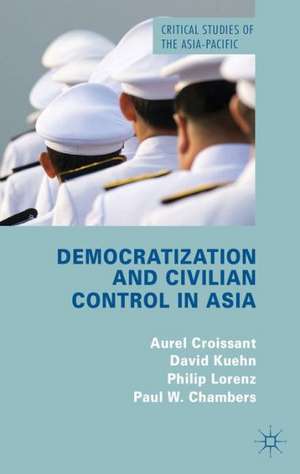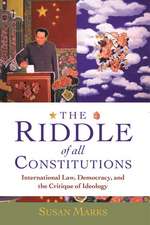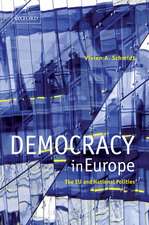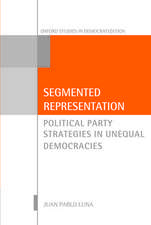Democratization and Civilian Control in Asia: Critical Studies of the Asia-Pacific
Autor A. Croissant, D. Kuehn, P. Lorenz, P. Chambersen Limba Engleză Hardback – 29 ian 2013
| Toate formatele și edițiile | Preț | Express |
|---|---|---|
| Paperback (1) | 384.48 lei 6-8 săpt. | |
| Palgrave Macmillan UK – 2013 | 384.48 lei 6-8 săpt. | |
| Hardback (1) | 392.60 lei 6-8 săpt. | |
| Palgrave Macmillan UK – 29 ian 2013 | 392.60 lei 6-8 săpt. |
Din seria Critical Studies of the Asia-Pacific
- 9%
 Preț: 630.14 lei
Preț: 630.14 lei - 18%
 Preț: 1003.70 lei
Preț: 1003.70 lei -
 Preț: 385.08 lei
Preț: 385.08 lei - 18%
 Preț: 782.57 lei
Preț: 782.57 lei - 18%
 Preț: 781.94 lei
Preț: 781.94 lei - 18%
 Preț: 729.36 lei
Preț: 729.36 lei - 15%
 Preț: 643.65 lei
Preț: 643.65 lei - 15%
 Preț: 644.18 lei
Preț: 644.18 lei - 18%
 Preț: 893.40 lei
Preț: 893.40 lei -
 Preț: 390.63 lei
Preț: 390.63 lei -
 Preț: 388.13 lei
Preț: 388.13 lei -
 Preț: 388.90 lei
Preț: 388.90 lei - 15%
 Preț: 475.93 lei
Preț: 475.93 lei - 18%
 Preț: 1112.92 lei
Preț: 1112.92 lei -
 Preț: 389.70 lei
Preț: 389.70 lei - 15%
 Preț: 506.14 lei
Preț: 506.14 lei -
 Preț: 383.93 lei
Preț: 383.93 lei - 15%
 Preț: 645.79 lei
Preț: 645.79 lei -
 Preț: 385.84 lei
Preț: 385.84 lei -
 Preț: 383.71 lei
Preț: 383.71 lei - 15%
 Preț: 686.18 lei
Preț: 686.18 lei - 18%
 Preț: 731.91 lei
Preț: 731.91 lei -
 Preț: 389.70 lei
Preț: 389.70 lei -
 Preț: 392.60 lei
Preț: 392.60 lei -
 Preț: 384.70 lei
Preț: 384.70 lei -
 Preț: 386.81 lei
Preț: 386.81 lei - 18%
 Preț: 781.62 lei
Preț: 781.62 lei -
 Preț: 383.93 lei
Preț: 383.93 lei - 15%
 Preț: 697.82 lei
Preț: 697.82 lei -
 Preț: 386.81 lei
Preț: 386.81 lei - 15%
 Preț: 501.06 lei
Preț: 501.06 lei -
 Preț: 382.36 lei
Preț: 382.36 lei - 15%
 Preț: 583.61 lei
Preț: 583.61 lei - 18%
 Preț: 728.28 lei
Preț: 728.28 lei - 15%
 Preț: 636.12 lei
Preț: 636.12 lei - 15%
 Preț: 642.51 lei
Preț: 642.51 lei -
 Preț: 390.63 lei
Preț: 390.63 lei -
 Preț: 393.52 lei
Preț: 393.52 lei - 15%
 Preț: 700.29 lei
Preț: 700.29 lei
Preț: 392.60 lei
Nou
Puncte Express: 589
Preț estimativ în valută:
75.12€ • 78.65$ • 62.16£
75.12€ • 78.65$ • 62.16£
Carte tipărită la comandă
Livrare economică 05-19 aprilie
Preluare comenzi: 021 569.72.76
Specificații
ISBN-13: 9780230285330
ISBN-10: 0230285333
Pagini: 269
Ilustrații: XIII, 269 p.
Dimensiuni: 140 x 216 x 25 mm
Greutate: 0.52 kg
Ediția:2013
Editura: Palgrave Macmillan UK
Colecția Palgrave Macmillan
Seria Critical Studies of the Asia-Pacific
Locul publicării:London, United Kingdom
ISBN-10: 0230285333
Pagini: 269
Ilustrații: XIII, 269 p.
Dimensiuni: 140 x 216 x 25 mm
Greutate: 0.52 kg
Ediția:2013
Editura: Palgrave Macmillan UK
Colecția Palgrave Macmillan
Seria Critical Studies of the Asia-Pacific
Locul publicării:London, United Kingdom
Cuprins
PART I Conceptualizing Civilian Control oft he Military Explaining Civilian Control of the Military in New Democracies PART II South Korea. Purges and Presidential Prerogatives Taiwan. From Martial Law to Civilian Control Indonesia. The Democratization of Personal Control Bangladesh. From Militarized Politics to Politicized Military The Philippines. Civil-Military Symbiosis under the Veneer of Civilian Rule Thailand. Civilian Control Deterred Pakistan. Military-Guided Transitions to Elected Government and the Failure of Civilian Control PART III Conclusion. Contours, Causes, and Consequences of Civilian Control
Recenzii
'This is an excellent book about democratic governance of the military in Asia, written by authors with a solid academic reputation on the issue of civil-military relations. The book gives interesting concepts, insights and entry points for security sector reform and its relation with democratic consolidation in the region. Governmental readers should be sobered, and non-governmental ones energised, by this timely book.' - Hans Born, Geneva Centre for the Democratic Control of Armed Forces, Switzerland
'This is a seminal work on the comparative analysis of civilian control of the military in Asian new democracies. Analytically innovative, empirically rigorous, and rich in policy implication. The book is the 'must' reading for students of Asian politics and comparative analysis of civil-military relations.' Chung-in Moon, Professor of Political Science, Yonsei University, South Korea
'This excellent monograph contributes tremendously to our understanding of at least two major issues. In raising and answering the three main questions of achieving democratic civilian control of the military in any country the challenges facing civilians, diminishing military prerogatives and achieving control, and the risks of failure the authors provide unparalleled insights into the successes, and failures, of democratic consolidation in countries ranging from South Korea and Taiwan to Thailand and Pakistan.' - Thomas C. Bruneau, Distinguished Professor of National Security Affairs, Naval Postgraduate School, Monterey, California, USA
'This is a seminal work on the comparative analysis of civilian control of the military in Asian new democracies. Analytically innovative, empirically rigorous, and rich in policy implication. The book is the 'must' reading for students of Asian politics and comparative analysis of civil-military relations.' Chung-in Moon, Professor of Political Science, Yonsei University, South Korea
'This excellent monograph contributes tremendously to our understanding of at least two major issues. In raising and answering the three main questions of achieving democratic civilian control of the military in any country the challenges facing civilians, diminishing military prerogatives and achieving control, and the risks of failure the authors provide unparalleled insights into the successes, and failures, of democratic consolidation in countries ranging from South Korea and Taiwan to Thailand and Pakistan.' - Thomas C. Bruneau, Distinguished Professor of National Security Affairs, Naval Postgraduate School, Monterey, California, USA
Notă biografică
AUREL CROISSANT teaches Political Science at Heidelberg University, Germany. His research interests include comparative politics, especially in East and Southeast Asia, theoretical and empirical research on democratization, civil-military relationships, terrorism and political violence, political parties, and the comparative study of authoritarianism.
PAUL W. CHAMBERS is Political Science Lecturer and Director of Research at the Southeast Asian Institute of Global Studies, Payap University, Chiang Mai, Thailand. His research interests and published works focus on politics in Southeast Asia with thematic emphasis on democratization, civil-military relations, international politics, and political economy issues.
DAVID KUEHN is a research fellow at the Institute of Political Science, Ruprecht-Karls-University, Heidelberg, Germany. His research focuses on civil-military relations, democratization studies, social science methodology and game theory. He has published in various peer-reviewed journals, including Democratization, the Journal of East Asian Studies, and European Political Science.
PHILIP LORENZ is a lecturer and research fellow at the Institute of Political Science, Ruprecht-Karls-University, Heidelberg, Germany. His research focuses on civil-military relations, democratization studies and civil society. He has published in several peer-reviewed journals, including Party Politics and the Asian Journal of Political Science.
PAUL W. CHAMBERS is Political Science Lecturer and Director of Research at the Southeast Asian Institute of Global Studies, Payap University, Chiang Mai, Thailand. His research interests and published works focus on politics in Southeast Asia with thematic emphasis on democratization, civil-military relations, international politics, and political economy issues.
DAVID KUEHN is a research fellow at the Institute of Political Science, Ruprecht-Karls-University, Heidelberg, Germany. His research focuses on civil-military relations, democratization studies, social science methodology and game theory. He has published in various peer-reviewed journals, including Democratization, the Journal of East Asian Studies, and European Political Science.
PHILIP LORENZ is a lecturer and research fellow at the Institute of Political Science, Ruprecht-Karls-University, Heidelberg, Germany. His research focuses on civil-military relations, democratization studies and civil society. He has published in several peer-reviewed journals, including Party Politics and the Asian Journal of Political Science.
















